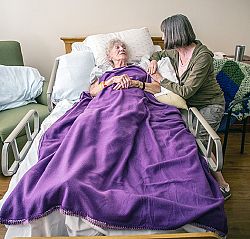Catholic teaching calls for preserving the sanctity of the terminally ill and dying
Friday, Nov. 08, 2024

CNS photo/Gregory A. Shemitz
+ Enlarge
Kaitlin Hoffman, licensed practical nurse, visits with patient Doraina Alioto at Catholic Health’s Good Shepherd Hospice site in Port Jefferson, N.Y., May 6, 2021.
SALT LAKE CITY — For Catholics, November can be a time to reflect on the Church’s teachings about death and dying. The month begins with the celebration of the feasts of All Saints and All Souls, remembering “those who have died and have gone before us marked with the sign of faith,” as the first Eucharistic Prayer states. In the secular world, November is National Hospice and Palliative Care Month, and Catholic teaching offers a unique perspective in these areas.
Understanding the need to preserve the sanctity of the terminally ill and dying, in 2020 the Vatican’s Congregation for the Doctrine of the Faith released the letter Samaritanus bonus, (on the care of persons in the critical and terminal phases of life). This document affirms the Church’s teaching on care for those who are critically ill or dying. It also offers pastoral guidance for those caring for those at the end of life.
“In the face of challenges that affect the very way we think about medicine, the significance of the care of the sick, and our social responsibility toward the most vulnerable, the present letter seeks to enlighten pastors and the faithful regarding their questions and uncertainties about medical care, and their spiritual and pastoral obligations to the sick in the critical and terminal stages of life,” the document says.
“Advances in medical technology, though precious, cannot in themselves define the proper meaning and value of human life,” it also says. “In fact, every technical advance in healthcare calls for growth in moral discernment to avoid an unbalanced and dehumanizing use of the technologies especially in the critical or terminal stages of human life.”
The full text of the letter is available at https://press.vatican.va/content/salastampa/en/bollettino/pubblico/2020/09/22/200922a.html.
November was established as National Hospice and Palliative Care Month in 1978 by President Jimmy Carter to recognize those who provide end-of-life care, and to raise awareness of the hospice movement.
“It’s great to have a month that’s focused on this area of respecting the dignity of life, particularly for people who are going through serious illnesses, for themselves or for their loved ones, because it’s a really stressful time and fraught with a lot of difficulties, and so I think it’s wonderful to have greater awareness about hospice and palliative care services, which are meant to support these patients through their serious illness and through the end of their early life,” said Dr. Natalie King, a Catholic who is a palliative care physician practicing in Ogden.
This November observance gives those who cherish life an opportunity to understand that “pro-life” is a term that also includes fighting for the rights and dignity of the dying, said King, who sees many similarities in advocating for the vulnerable at both the beginning and the end of life.
“Euthanasia is abortion at the end of life,” she said. “I think that the end of life can be a real beautiful time. Some people describe the role of the hospice worker, those in palliative care, as kind of being a midwife for the soul, walking with that person and their family, to accompany them on the life that God is in control of.”
For Catholics trying to live their faith and wanting to apply Church teachings to their decisions around serious illness and end of life, King wrote Intensive Caring, A Practical Handbook for Catholics About Serious Illness and End of Life Care, which was released last month by Ave Maria Press. In the book King stresses the importance of advanced directives, naming a supportive advocate and having open communication with healthcare teams about one’s Catholic faith and end-of-life wishes.
The impetus for writing the book came about shortly after King first started practicing medicine in Denver, Colo., when assisted suicide was legalized in that state.
“It really made me think about what it meant to practice in this field as a Catholic and what it meant to advocate for patients and their families, and how I would help stand up for life,” she said.
At the time, King received many questions from Catholics and others opposed to assisted suicide, and was asked to speak to several organizations about this subject. As she spoke with others, she realized there is a lot of misunderstanding around palliative care and hospice, and that some people have a lot of fears based on their or others’ negative experiences. The book seeks to answer these questions and to provide basic information for Catholics.
“I just wanted to be helpful any way I can to people who find themselves in these difficult situations,” King said.
Also for National Hospice and Palliative Care Month the USCCB has developed a free parish leader kit, “Catholic Care for the Sick and Dying,” dedicated to providing resources surrounding end-of-life issues. A special edition of the monthly parish resource Word of Life, it contains a summary of key sections of Samaritanus bonus. It also includes educational articles on end-of-life issues and prayers centered on end-of-life concerns. It can be found at https://www.usccb.org/prolife/catholic-care-sick-and-dying.
For questions, comments or to report inaccuracies on the website, please CLICK HERE.
© Copyright 2024 The Diocese of Salt Lake City. All rights reserved.
© Copyright 2024 The Diocese of Salt Lake City. All rights reserved.

Stay Connected With Us